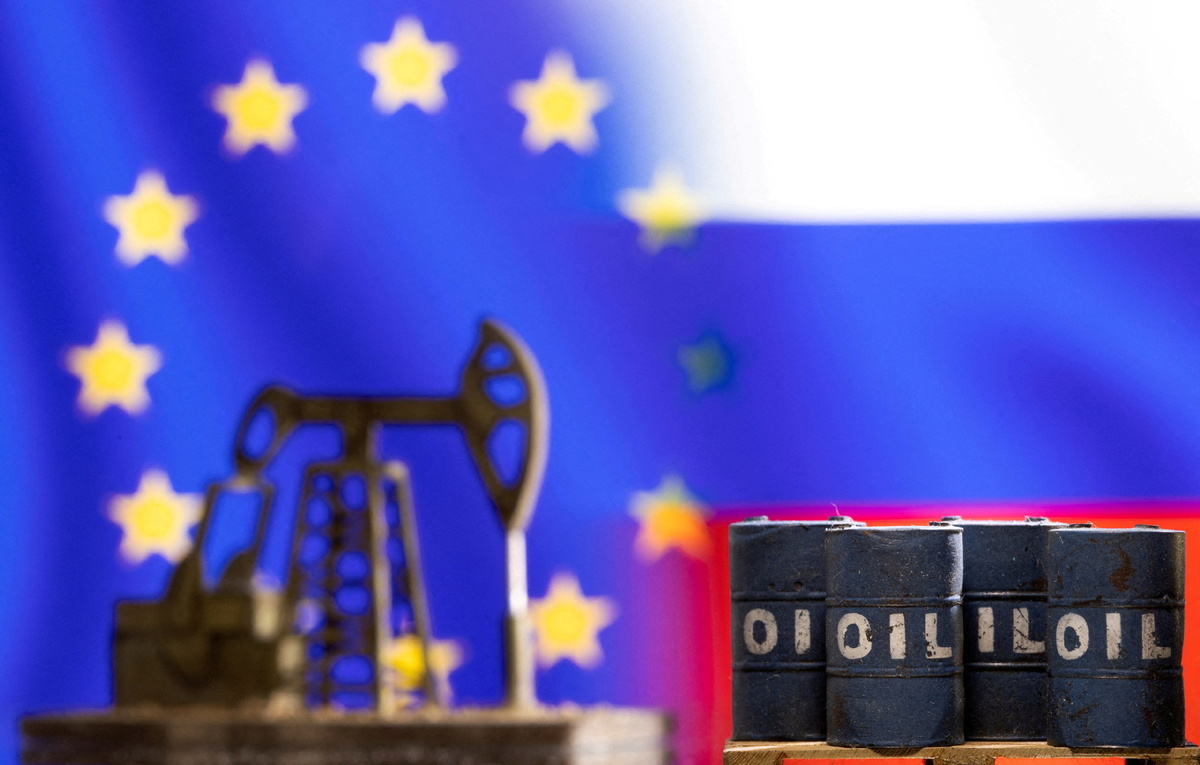Green shift on way, but with trade-offs
By CHEN WEIHUA in Brussels | China Daily Global | Updated: 2022-06-06 09:42

For EU, fossil fuels come in from the cold on path away from Russian energy
The European Union hopes that the Russia-Ukraine conflict will hasten a shift away from its dependence on Russian energy to a faster takeup of renewables, but it also expects that short-term trade-offs-from a spike in the use of fossil fuels-are unavoidable in achieving its goals.
At an EU summit on May 30, member states agreed to a partial ban on Russian oil, ending seaborne imports by the end of the year but exempting oil delivered by pipeline. In the fifth round of sanctions unveiled in April, the EU had agreed to phase out Russian coal imports by August.
The European Commission said it would phase out dependence on Russian gas well before the end of the decade, according to its REPowerEU plan announced on May 18 that aims to reduce dependence on Russian fossil fuels and rev up the region's green transition.
The EU is Russia's largest energy client. Last year, the bloc imported from Russia about 40 percent of its natural gas needs, 46 percent of its coal and 27 percent of its oil, in trade worth about 100 billion euros ($107 billion).
The REPowerEU plan, with 300 billion euros ($321 billion) in funding, has set an ambitious goal of raising the EU's 2030 target for renewables from the current plan of 40 percent to 45 percent. It also includes diversifying the EU's supplies from other sources and investing in infrastructure for liquefied natural gas imports.
The EU and its member states have stepped up efforts to reach out to other oil and gas suppliers in the past months, including the United States, Norway, Azerbaijan and those in the Middle East.
Some EU states indicate that they may even have to resort to dirty coal by reactivating old, decommissioned coal-fired power plants.
European Commission Executive Vice-President Frans Timmermans, who is in charge of the EU's Green Deal, with the goal of climate neutrality by 2050, admitted in a news conference on the REPowerEU plan that "we have no choice but to look for (fossil fuel) alternatives in the short run".
The problem is especially acute for Germany, the region's largest economy. The new government of Chancellor Olaf Scholz pledged in December to phase out coal by 2030 instead of the previous goal of 2038, but German energy companies are considering getting retired coal-fired thermal power plants back online.
A bill submitted last month by Robert Habeck, Germany's minister for economic affairs and climate action, ordered that coal-fired plants due to be shut down be placed in reserve as part of a contingency plan to ensure the country's electricity supply in case Russia cuts natural gas supplies on short notice, as in the case of Poland and Bulgaria in late April and the Netherlands and Denmark over the past week.
Coal-fired power plants generated about 30 percent of Germany's electricity last year.
"Short term it may be that, as a precaution and in order to be prepared for the worst, we have to keep coal-powered plants on standby and maybe even let them operate," Habeck, who belongs to the environmentalist Greens party, told German public radio Deutschlandfunk.
Bad time for Germany
The energy crisis has come at a bad time for Germany, which is determined to decommission its last three nuclear reactors by the end of the year.
Italian Prime Minister Mario Draghi, whose country also depends heavily on Russian energy, has said the country will increase the domestic production of gas and may reopen coal-fired power stations to ensure energy security.
"The reopening of coal-fired power stations could be used to make up any shortfall in the immediate future," Draghi said, while emphasizing the importance of switching to renewables in the future.
Romanian Environment Minister Barna Tanczos is of the same view, saying "we will have to restart the coal-fired power plants" as a temporary move.
France is in talks with the United Arab Emirates to reduce Russian oil purchases, which will stop after the imposition of the EU ban on Russian crude oil, according to a Reuters report.
"There are discussions with the United Arab Emirates. We have to find an alternative to Russian oil," Finance Minister Bruno Le Maire told Europe 1 radio on Sunday.
Ingvild Sorhus, the lead European carbon analyst at Refinitiv, a financial markets data and infrastructure provider, said that while the EU is fundamentally reorienting its energy policy after the outbreak of the Russia-Ukraine conflict, a massive deployment of low carbon and energy-efficient technologies cannot be done overnight.
"Hopefully, the decarbonization efforts in (the) REPowerEU plan could pick up quickly enough to offset these adverse impacts on EU emissions," she told China Daily.
Erik Solheim, a Norwegian politician and former executive director of the United Nations Environment Programme, said: "In the short run the conflict may affect the green shift negatively as it encourages new developments of oil and gas and makes them more profitable."
But in the long run, he said, the conflict "will speed up the green shift".
European Commission President Ursula von der Leyen vowed that 95 percent of the 300 billion euros in the REPowerEU plan will be dedicated to clean energy, but critics have denounced the decision earmarking a huge amount for oil and gas infrastructure and LNG terminals.
In a letter to von der Leyen signed by 150 business leaders in May, the EU was called on to avoid investing in new fossil fuel infrastructure and instead accelerate the push toward electrification, renewables and energy efficiency.
"It is time for all of us to take the necessary steps to strengthen Europe's energy security and resilience by accelerating the green transition," the letter said.
























